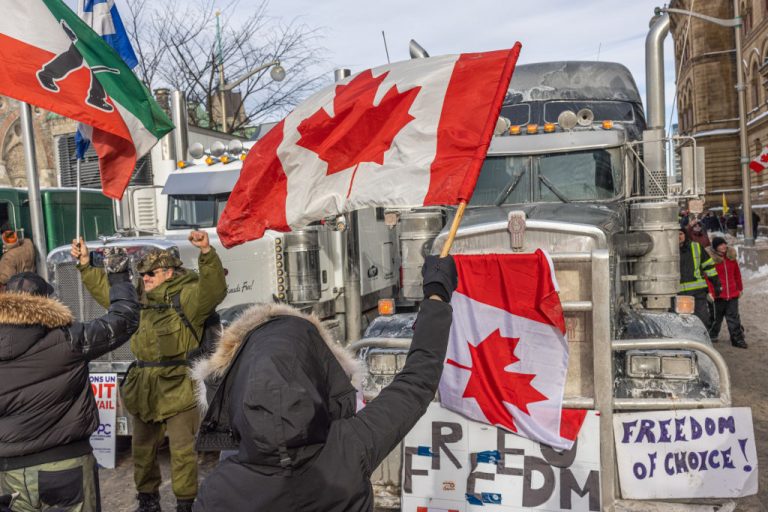Widespread civil unrest in Canada — led by thousands of truckers opposed to COVID-19 public health measures they say are government “overreach” — may be having an impact on government policy.
In the shadow of the main protest in Ottawa while citing a desire to protect “social cohesion,” on Feb. 1, Quebec Premier, Francois Legault, dropped his government’s plan to tax unvaccinated citizens. “I have to make sure that I protect the health of Quebecers, but I have also to protect the peace in our society,” Legualt said, adding that “In the last week or so there’s an increase in the reaction of people. They are angry more than ever. I don’t like to see Quebecers divided like we’re seeing.”
In January, the Quebec government announced a “health contribution” tax on the unvaccinated that the provincial government said at the time would be “significant” arguing that the unvaccinated population of Quebec placed an undue “financial burden [on] all Quebecois.”
According to government data, in Quebec, over 85 percent of residents have had at least one dose of a COVID-19 vaccine.
In the Canadian province of Alberta, where a blockade of hundreds of trucks have brought cross-border travel to a standstill at the Coutts border crossing, Provincial Premier Jason Kenney has indicated that his government will move forward the date it intends to relax some COVID-19 health measures.
Success
You are now signed up for our newsletter
Success
Check your email to complete sign up
On Jan. 25, Alberta health minister, Jason Copping, when asked when Alberta intended to start lifting COVID-19 health measures in the province responded saying, “I can’t give a date.”
On Jan. 27, two days prior to the main protest in Ottawa, Jason Kenney said that now is not the right time to begin lifting restrictions. “We are continuing to see upward movement in our in-patient hospital beds, hospitalisation pressure from COVID-19. We’re at in fact the highest point in two years, in terms of people in hospital with COVID.”
“I did say when we brought the proof of vaccination program in, back in September, that I did not foresee it going past the first quarter of 2022, that would be the end of March,” Kenney said at the time.
However, on Feb. 1, at a press conference on COVID-19 Kenney said that he hopes to lift pandemic restrictions sometime “this month”, so long as COVID-19 hospitalizations continue dropping in Alberta.
“With the overall trends, I am very optimistic that we will be able to move forward with meaningful relaxation of public health measures this month, including the elimination of the restriction exemption or proof of vaccination program,” Kenney said.
The restriction exemption or proof of vaccination program is akin to a vaccine passport system that has been widely adopted in many countries across the globe.
Reports of violence, more protests emerge
Reports of violence at the Coutts Border-crossing, where hundreds of truckers have blocked cross-border traffic, have emerged with provincial Premier Jason Kenney calling for “calm” as the Royal Canadian Mounted Police (RCMP) coordinate and try to come up with a plan to deal with the protesters.
“I’ve received reports in the last hour of people aligned with the protesters assaulting RCMP officers, including one instance of trying to ram members of the RCMP, later leading to a collision with a civilian vehicle,” Kenney said adding that, “This kind of conduct is totally unacceptable … Without hesitation, I condemn those actions and I call for calm.”
However, the RCMP are unable to confirm that the violence was by the hands of the protesters.
On Tuesday, following the breakdown of negotiations between RCMP and protesters, some vehicles left the protest but other protesters immediately joined the blockade including two large tractors sporting Canadian flags.
“We [began] to remove some vehicles from the protest area. A few left. I didn’t get an exact count of how many went out. And then we received notification that additional protesters were arriving on the scene and came around our secured area,” RCMP Cpl. Curtis Peters told The Canadian Press.
Some progress has been made as truckers involved with the blockade have opened up two lanes, allowing access to the U.S. border, the Calgary Herald reported.
The RCMP face a monumental task and are struggling to obtain civilian cooperation to dismantle the blockade of hundreds of truckers.
The Western Standard, a local media outlet, reported on Feb. 1 that RCMP, seeking the help of local towing companies, are being told “no” as towing companies want to stay out of the drama and preserve the relationships they have with local trucking companies.
“We have created relationships in our community and contracts that would be in jeopardy if we participate in any way,” one tow truck company worker, who asked to remain anonymous, told the Western Standard. “A lot of these smaller companies don’t want to ruin their reputation in the communities they serve so they don’t want to get involved,” he said.
Meanwhile, on Feb. 2, calls to block roads in Canada’s energy capital, Calgary, have emerged online. The protests have reportedly been dubbed “Operation Bearhug” and intend to snarl traffic in the city
“We are aware of the potential for some convoys along several roadways in Calgary today and will respond accordingly,” a spokesperson with Calgary Police Services (CPS) wrote in an email to local media outlet The Calgary Herald.

















